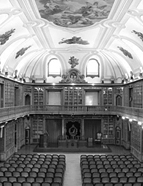

Thus, it is clear that this period, while stimulating vocations and orientations (though not necessarily methodological revolutions) in Portuguese historiography from 1788-1795, was followed by a period of stagnation in the quality of the institution's historiographical production, and the decline of the ACL's role as a vanguard in historical studies in Portugal between 1826 and 1846. This period of stagnation remains one of the key enigmas in the study of 19th century Portuguese historiography. How does one explain the evolution (or regression) of historical studies from the late 18th and early 19th centuries to the time of Alexandre Herculano's História de Portugal, whose first volume was published in 1846? Despite continuing to act as the guardian of historical work in Portugal during the 1820s, 1830s, and 1840s, according to its role as an official academic body supported by royal patronage (as had been the case with the Real Academia da História during its period of greatest brilliance), the ACL, due to financial and other difficulties, was not always able to attract the historians who stood out for bringing scientific innovations to historiography. Portuguese official historiography involved other institutions besides the ACL. The search for a political and institutional memory of the state, which aimed to provide documenta l support, was ensured by erudite and diplomatic investment through the Secretary of State for Foreign Affairs, which financed the Quadro Elementar ... (1842-1854), as well as other works by the Viscount of Santarém, which were of a geographic and cartographic nature, manifestly supported by official patronage and proposing a narrative essentially focused on dynastic unity and the overseas experience. The liberal political culture assumed the appropriation of national historical memory as one of its main challenges, and was swift to mobilise human and scientific resources to give Portugal a more readily assimilable image in foreign scientific and diplomatic forums, especially through the publication of texts in French and English. In this regard, history, geography, and cartography developed symbiotic relationships, though with tenuous scientific boundaries, following a tradition that had already existed within the ACL. Meanwhile, in a speech on 21 January 1843, Costa de Macedo still invoked the example of the patriarchs of 1788-1795 when referring to the Colecção de Notícias para a História e Geografia das Nações Ultramarinas (História e Memórias … [History and Memoirs...] 2nd series, vol. I, part II, 1844, p. III) and the Efemérides Náuticas [Nautical Ephemerides], which consisted of collections of texts and data with no impact or methodological innovation whatsoever, merely perpetuating a tradition that had long since lost any real virtue except for self-congratulation. However, Costa de Macedo did place particular emphasis on the Moral and Political Sciences, which indicated a clear (albeit difficult to achieve) desire for real changes in the use of historical and scientific knowledge for the regeneration of society and politics, which had long been delayed.
